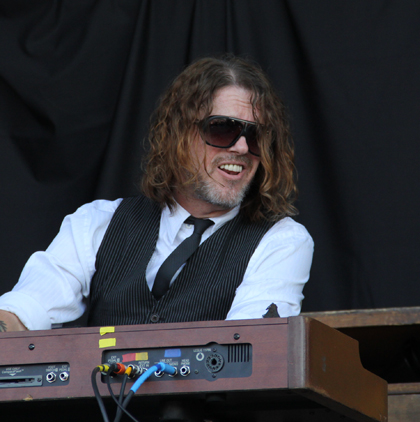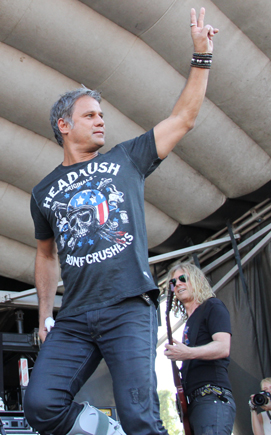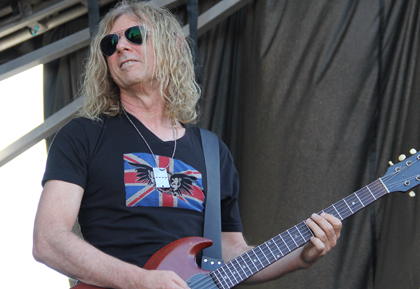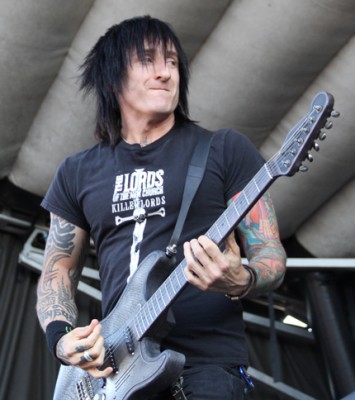RARELY DOES A ROCK KEYBOARDIST receive such heroic applause, unless of course, that keyboardist’s name is “Elton,” which is clearly not the case this afternoon. Stylishly wrapped in a tapered vest and skinny tie, the man stands up from his Roland XK-3 to acknowledge the thunderous reception that erupted the moment he sauntered onto the stage.
 He is Dizzy Reed, the longtime keyboardist for Guns N’ Roses, and in this sun-splashed outdoor venue just north of the Mexican border, seemingly every punter in attendance is acutely aware of, and thrilled by, his mere appearance.
He is Dizzy Reed, the longtime keyboardist for Guns N’ Roses, and in this sun-splashed outdoor venue just north of the Mexican border, seemingly every punter in attendance is acutely aware of, and thrilled by, his mere appearance.
In front of Dizzy, spiky hair cutting across his face and a guitar slung low over his shoulder, stands Richard Fortus, the GNR guitarist since 2001, although his resume additionally includes The Psychedelic Furs, Love Spit Love and Thin Lizzy.
Axl is not in the building however, as this is no Guns N’ Roses gig. Reed and Fortus have taken the stage with their newest side project, The Dead Daisies, a star-spangled outfit of grizzled classic rock veterans whose additional members include bassist Darryl Jones (the Rolling Stones), drummer Charley Drayton (The Cult, Cold Chisel, the Divinyls), and co-founders, vocalist Jon Stevens (INXS, Noiseworks) and guitarist David Lowy (Red Phoenix, The Angels).
Tapping into the hook-propelled, guitar-driven thrust of mid-70s arena rock, the Dead Daisies wrote and recorded a seething, blues-soaked debut in less time than it takes some bands to secure a rehearsal space. Including a guest appearance from Slash on the storming “Lock’N’Load,” this 12-track classic rock feast quickly earned them support slots for both ZZ Top and Aerosmith, as well as a high profile spot on this summer’s Uproar festival, along with Alice in Chains and Jane’s Addiction.
We hopped onto the band’s tour bus to chat with Jon and David about the blustery reception they’ve received and to find out just how many days it takes to write and record nearly three dozen brand-new songs.
So you two put this whole thing together when you both had other active projects, so what inspired you to form the Dead Daisies?
 Jon: It was the songwriting, really. We got together and we just really hit it off in the songwriting department. Everything happened in a very short span of time.
Jon: It was the songwriting, really. We got together and we just really hit it off in the songwriting department. Everything happened in a very short span of time.
David: When we got together, we sat down and wrote thirty songs in five days, so we realized that things were going to work between us. There was clearly something special there that we knew we should continue with.
What does this project give you that you don’t experience with your other commitments?
Jon: For me, it’s great to be in a band again—my own proper band—with all new original music. I’ve been a solo artist for awhile, and I’ve been in other bands, but this is a new band with fresh material. It’s a brand new thing and it’s really exciting, because we do whatever the hell we want to do, like writing songs that we like. The fact that we’ve attracted all of these other players is really a testament to this music.
Is there a sense of permanence to this project, or is this more of a one-off situation?
David: There’s a definite permanence to it. Today people manage several different projects at the same time. It’s different than it was twenty or thirty years ago, and artists, songwriters and musicians today do many things, and this is one of the things that we do. It definitely has some permanence to it because we’ve still got many, many songs to write and many shows to do and we get to share this passion with other musicians and play the kind of music that we love.
Sonically, what do you see as the cornerstone of your sound?
Jon: It’s melodic rock, riffy with big choruses. The thing with this stuff is that when you see it live, it’s much better, because it’s not over-produced. It’s simple and the songs were all written on acoustic guitars, so they can work in that format, or they can work in any other format. So it’s staying away from the technology and keeping it real and not over-producing.
 David: We recorded the album in twelve days. Finished it in twelve days. We wrote thirty-four songs or something, and these twelve ended up on the record. That was all the time that we had and we did what we had to do. I personally don’t believe in overdoing it. If you’re going to take more than twelve days, then you need twelve months. There’s a lot you can do in twelve days and there’s a lot that comes out, and after that time, that’s it—make the best of what you’ve got. If the song’s good, the song’s good, and if the lyric’s good and it touches something inside you, then it’s a good lyric.
David: We recorded the album in twelve days. Finished it in twelve days. We wrote thirty-four songs or something, and these twelve ended up on the record. That was all the time that we had and we did what we had to do. I personally don’t believe in overdoing it. If you’re going to take more than twelve days, then you need twelve months. There’s a lot you can do in twelve days and there’s a lot that comes out, and after that time, that’s it—make the best of what you’ve got. If the song’s good, the song’s good, and if the lyric’s good and it touches something inside you, then it’s a good lyric.
Jon: It’s amazing what you can do when you know you’re under the gun. Having a deadline is a really good thing.
David: We only have so many days and we don’t have one to waste.
When I first listened to the album, I was struck by what I felt was a rather heavy Southern rock influence. Would you say that’s fair?
David: Well it could be, but I don’t really think about it. I grew up in Australia and Jon grew up in New Zealand, but growing up in Australia, my first favorite band, and the first record I bought was by a band called The Easybeats, which featured George Young and Harry Vanda (who would later co-produce some of the biggest releases in AC/DC history), and I suppose that’s where my roots first grew, but all of the things that we’ve heard over the years influence us. It might be Southern, it might be Aussie rock, it might be American or British rock, but it’s The Dead Daisies. That’s what this is.
Jon, who were your influences growing up?
Jon: I’m the youngest of eleven children, so I heard everything. I didn’t have any dibs on the stereo, I just heard whatever was going on from everybody, so I’m like a bastard child of music. I like everything, too. If a music has some effect on me, then it’s a beautiful thing.
Normally you’ve got six players on stage at any given time. Is it ever a challenge making room for everyone, musically?
Jon: No, because we’ve all been there, done that. This is kind of like a relief for everyone from their normal jobs.
David: The enjoyment is the sharing of it, not who’s out in front. You love what you do and they love what they do, and you respect that and you share it.
 Although you draw from rock influences across the globe, who would you identify as the five most important rock acts from America?
Although you draw from rock influences across the globe, who would you identify as the five most important rock acts from America?
Jon: Wow. (long pause) I’d say Aerosmith would be up there, as far as rock acts go. And I love Credence.
David: Guns N’ Roses, definitely, Credence and Aerosmith.
Jon: Hendrix! He’s American. I’d say that Nirvana were massively influential, but after he popped himself, I kind of had more respect for him, actually. I used to read everywhere about how he hated it—he hated the business and he hated everything and he was just anti. I felt like, Well, fucking stop what you’re doing. If you don’t like it, quit. So when he did shoot himself, it was a shame, because he was amazingly talented, but if you really hate what you’re doing, then why are you doing it?
What’s next?
Jon: We’ve already got material ready for the next album and then we’re off to the UK. It’s just awesome to get up on stage and play your own music that you love for people, and to see how much they enjoy it.
http://open.spotify.com/user/joed_sandiego/playlist/5LUzuxRvNxfEhv3yQeYLJV


